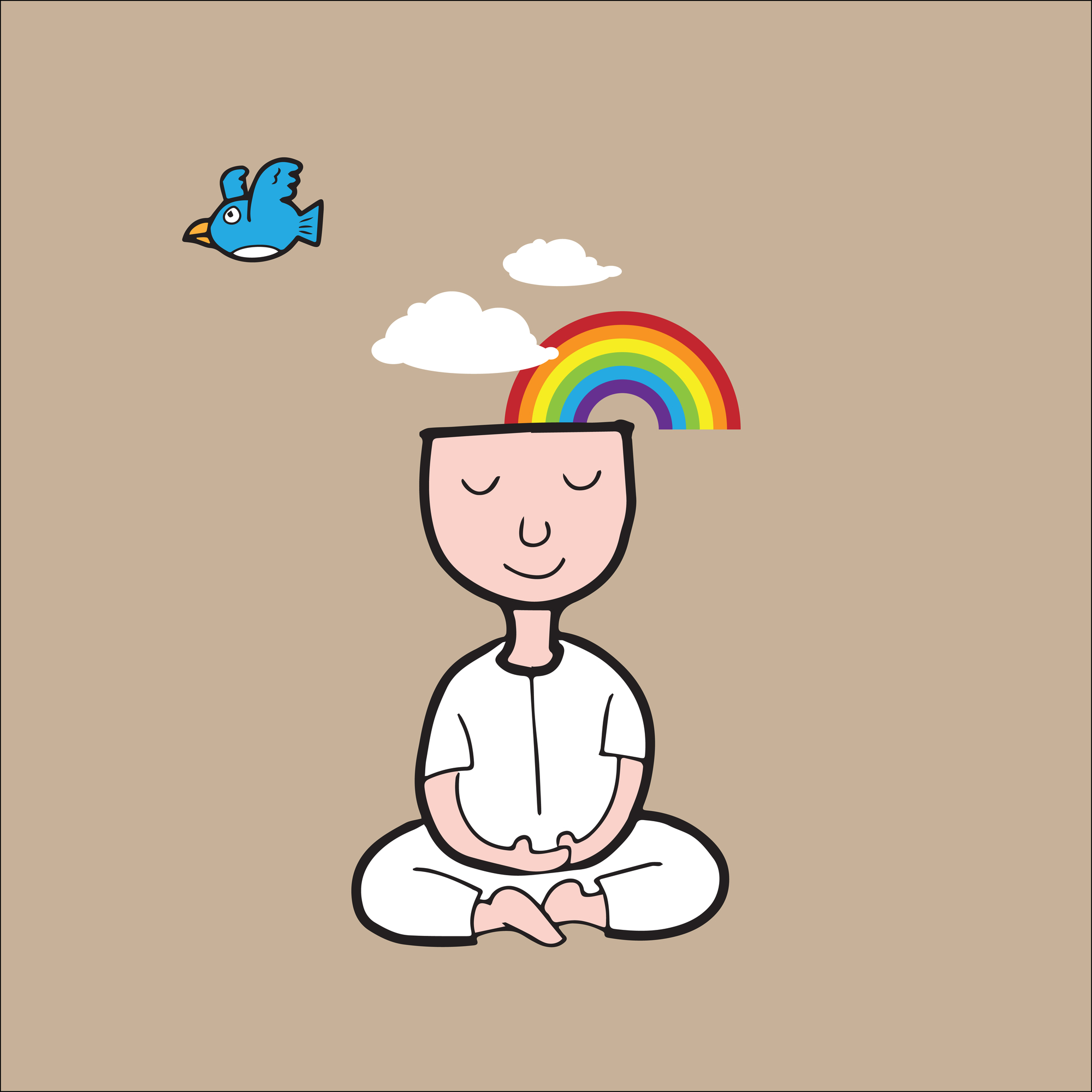Meditation has slowly become an accepted part of mainstream culture and is changing lives around the world.
Virtually everyone has either heard of it, knows someone who is regularly practicing it, or is doing it themselves.
Meditation isn’t reserved for the creative careers either, something only writers or artists might benefit from.
Busy moms, senior executives, teachers, service industry professionals, and more can all find benefit from a regular meditation practice.
The US Marine Corps has even considered incorporating meditation into their training curriculum as a way for military service members to reduce stress.
Countless individuals are currently considering incorporating meditation into their lives. One simple question many ask themselves is: Should I start meditating?
While some would say that the answer is an obvious “yes,” meditation might not be the best for everyone.
Before starting anything new (including meditation), there are certain pros and cons involved in a regular meditation practice that should first be considered.
If you’ve been thinking about beginning to meditate, you can evaluate the pros and cons of meditation and decide for yourself if meditation is the right choice for you.
What Are the Pros of Meditation?
The primary advantage to incorporating a regular meditation practice into your life is increased overall resilience to the stress that life will inevitably throw your way.
Meditation allows you to quickly initiate coping skills when necessary because the mind is able to recognize problematic experiences early on.
Think of meditation like a reset button for the mind. You get to reboot.
Following are other advantages of a regular meditation practice you might consider when deciding whether or not meditation is right for you.
#1. Meditation is not something that is difficult to begin
We have developed this idea that meditation is partially spiritual, partially internal, and not very fun to do.
Who wants to sit down for minutes on end doing nothing, right? Meditation, however, is much more than any label we can associate with it.
Sometimes it is difficult to begin simply because it is forcing us to look at the world differently. We even have multiple tabs on our internet browsers now – we’re encouraged not to focus on a single point.
Meditation changes that perspective.
#2. You can meditate virtually anywhere
There is no “perfect” place to meditate that works for everyone.
One person’s tranquil pond is another person’s outdoor environment with tons of squirrels to watch.
Thankfully all you need to begin meditating is yourself.
You can meditate almost anywhere.
Even sitting in rush hour traffic offers an opportunity to meditate.
Focusing on the breath for just a few minutes can dramatically reduce any tension you might be feeling when stuck in traffic for what seems like hours on end.
Just make sure not to close your eyes!
#3. The benefits of meditation can be experienced very quickly
It may take as little as 4 days to begin experiencing the benefits of meditation.
A common myth about meditating is that it takes years to begin to see progress and this simply isn’t true.
Decreased levels of anxiety, stress, and increased memory capabilities can be experienced almost immediately.
Many people also experienced better immune functioning and decreased blood pressure levels as well.
#4. There are many different types of meditation to experience
Meditation has hundreds of different forms and outcomes.
We often think of meditation as something that occurs in the lotus position with a candle flame to provide a focus point, but this isn’t the only type of meditation that exists.
Loving-kindness meditation puts the focus on being grateful for family and friends and wishing them well.
Mindfulness meditation seeks out the perfection that is found in everything, and is something that can be practiced doing the things you do every day.
Mindfulness is simply the practice of paying attention, on purpose, without judgement to the present moment.
Walking the dog, doing the dishes, and taking a shower can all be done taking a mindful approach.
#5. Anyone in any religion or spiritual lifestyle can meditate
Meditation can have a spiritual component too, but only if this is something desired by the individual practicing it.
Anyone, regardless of their religion or spiritual beliefs can meditate.
Meditation isn’t “praying” to a specific deity.
It simply involves developing the presence of the mind, body, and heart working together.
While some individuals may want to avoid the incorporation of new philosophies that go against their personal beliefs in some guided meditation sessions, anyone from any religious or spiritual background can meditate without straying from their chosen path.
#6. It can be done on your own or with others you trust
The positive effects of meditation can be experienced on your own.
They can also be experienced in a group. Meditating at home with your family is one example of practicing meditation as a group.
If you have a group of trusted co-workers at work, you might consider meditating together during your lunch break.
Meditation is excellent for increasing focus and concentration, something we could all use a bit more of at work.
According to the Chopra Center, group meditation can help reinforce your desire to make meditation a daily practice.
Being part of a group can make you feel more dedicated to your practice and can help beginners practice the various concepts together in a supportive environment.
If you want to know how to start meditating daily and are struggling on your own, consider group meditation for 14-21 days to see if it can jump start your habit.
#7. Regular meditation can increase your creativity
One of the first things that begins to fade after fatigue sets in right around midday is your creativity.
Many of us can recognize this feeling as it begins to creep in and we give it creative names: the 3pm Wall, the Mid-Afternoon Blues, the Afternoon Slump.
How do we typically combat this problem? With snacks, sugar, and stimulants.
While these might seem to help in the short term, they really only make you feel worse.
Consider a mid-afternoon mini meditation, which can help restore the creative centers in the brain in just minutes because it allows the mind to rewire itself for the remainder of the day.
#8. Regular meditation encourages healthier eating choices
When you’re tired, what’s the first thing you crave as an eating option?
If you’re like most people it’s usually something with high levels of sugar, caffeine, and fat.
Chocolate cake, doughnuts, coffee, and ice cream – they all fit into this picture.
Who doesn’t crave a frozen, sugary, caffeine-filled Frappuccino when their energy starts to fade?
When fatigue sets in, we also tend to eat more in a serving than we would if we were not fatigued.
Make that a LARGE frozen, sugary, caffeine-filled Frappuccino, please.
Here’s the thing. Meditation can help limit these cravings because it prevents fatigue from putting its claws into your mind in the first place.
When you put good things into your body, good things are in turn experienced.
Let’s just say that meditation is definitely a good thing.
#9. Meditation improves your emotional wellbeing
Meditation is proven to reduce feelings of worry or anxiousness. This results in fewer impulsive decisions.
It can also help to lessen the feelings of fear, loneliness, and depression in many individuals.
This in turn can enhance personal self-esteem, confidence, and self-acceptance.
Meditation has also shown to help control chronic pain.
With less pain, pessimism can turn to optimism, and more relaxation may occur.
There is a greater awareness of the external world because the internal world is no longer focused on the pain.
With regular meditation, some even report an improvement in the positive social connections they are able to make.
There is a “sense” that their emotional intelligence received a boost.
Sometimes the way to feel better is to believe that you are going to be better.
Meditation can help make this happen.
What Are the Cons of Meditation?
When it comes to meditation, there truly aren’t any serious disadvantages.
It is a practice that is completely safe and has been encouraged for thousands of years.
There are no known negative medical side effects to meditation.
It is not something that will harm you or hold you back.
One small daily time commitment is all that is required to achieve the many advantages that meditation has to offer.
For some individuals, however, meditation may provide certain disadvantages that could be considered discomforting at times.
This can make meditation a difficult habit to establish should those circumstances occur.
Some of the things that might be considered “cons” when it comes to meditation include:
#1. Meditation can bring up old wounds
When the mind is clear, unresolved thoughts and tensions tend to rise to the surface.
Things you’d assume forget about can make their way back into your conscious thoughts.
These could be old emotional scars, painful memories, or even grief that has been set aside.
These are powerful thoughts and emotions that can be difficult to control, especially in a moment when you’re seeking clarity.
Meditation should not be used as a substitute for counseling or therapy, but it can help you better realize what you might need to address in order to feel your best and live your best life.
If you’re finding it difficult to meditate because you have powerful emotions or thoughts that come up when you do so, it’s best to try and resolve or treat these feelings in order for future meditation efforts to be fully successful.
#2. There may be “too many types” of meditation
There are different types of meditation that can be practiced, which, on one hand offers an advantage as it allows everyone to individualize their approach to a meditation practice.
On the other hand, it could be a disadvantage because the sheer number of various meditation practices to choose from can become overwhelming.
If you’ve tried meditation and feel it’s making you uncomfortable or it just doesn’t “feel right,” it could be that you’ve chosen the wrong type of meditation to meet your personal needs.
When it comes to meditation, there isn’t one “right” type. Everyone is different and has different needs.
If you’ve found meditation to be a struggle, you might try switching styles, finding a different class, or talking to a different mentor.
#3. It requires a time commitment
Meditation isn’t something that you fit into a schedule every so often.
It is a daily practice that requires your complete attention for a specific amount of time. There are no shortcuts available.
To maximize the benefits of meditation, expect to spend 10-20 minutes meditating every day.
Even 5 minutes of meditation a day can bring tremendous benefits to your life.
For many, life can be too busy to create that much time in a single block.
It’s said that the people that don’t think they have time for a regular meditation practice are the ones who need it the most.
Here’s the good news: the time spent in meditation tends to be cumulative in nature.
This means every minute you spend meditating will count toward the 20-40 minutes that is often recommended.
This means you can spend 2-5 minutes in meditation during breaks in the day and eventually get yourself up there.
If you’re new to meditation, start slow. Try 5 minutes in the morning and another 5 minutes before you go to bed.
You’ll begin to find that your body craves this time you give yourself and that you end up realizing there’s more time in the day to meditate than you initially thought.
#4. Meditation requires a certain amount of focus to be successful
Think there’s too much chaos surrounding you to commit to a regular meditation practice?
Everyone faces chaos everyday of their life.
The kids might be yelling. The dog might be getting into the trash in the garage. The doorbell rings. The phone rings. Your email dings. Your social media notifications light up with a ton of messages and comments.
Oh, and did you remember to update your blog today?
For meditation to find its maximum benefits, there must be a certain amount of comfort and quietness available to you.
And let’s be honest: quiet is a relative term.
As long as you are able to focus, identify thoughts, and categorize your mind, you’re in the right environment.
Unfortunately, there can be days when these environments are difficult to locate.
This is why finding time to meditate outside of your normal daily routine may be the best route to take.
Get up 15 minutes earlier each day and meditate for 10 minutes in the morning.
Instead of scrolling through social media at night before bed, put down your phone and meditate for 10 minutes before you go to sleep.
You’d get a daily 20 minutes of meditation and the adjustments required for your schedule would be minimal.
#5. It doesn’t always feel like it worked
You can meditate for 30 minutes and feel like nothing has happened.
The stress might still be there. You might feel fatigued and beaten down from the day.
This tends to happen when there is an expectation of perfection present at some level of consciousness.
For meditation to be its most effective, it is necessary to acknowledge our imperfections.
Many feel like they must be a different person outside of their home.
You might feel like meditation failed if you feel angry or get irritated easily.
It is easy to think that those who have practiced meditation for years have it all together and can always find clarity.
That just isn’t the case.
But people that meditate regularly do tend to react differently to situations out of their control than individuals who don’t meditate.
An individual who many would consider to be a meditation master once stated that in a 30-minute session, just two minutes of clarity was obtained.
That’s still two minutes more than without meditating.
Even when it doesn’t feel like meditation is working the way you think it “should” be, there are significant changes occurring in the brain that can offer increased clarity and peace of mind, even if you don’t automatically feel these subtle changes.
In Conclusion
Should you begin a regular meditation practice? Absolutely.
The pros of meditation are many, and the cons are not serious in the slightest.
The benefits of meditating clearly outweigh the few problematic issues that one might experience during their meditation practice.
Give it some thought.
Look at your schedule to see where you can fit in some time to meditate.
It’s likely a decision that will ultimately change your life.




